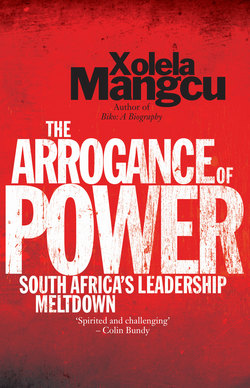Читать книгу The Arrogance of Power - Xolela Mangcu - Страница 5
На сайте Литреса книга снята с продажи.
ОглавлениеA presidential chronology
In 1991, at the ANC’s 48th national conference held in Durban, Nelson Mandela was elected as president, succeeding Oliver Tambo, who was elected as national chairperson. Walter Sisulu was elected as deputy president.
Following the ANC’s election victory in April 1994, the national assembly elected Mandela as South African president. He appointed the leader of the National Party (NP), former president F W de Klerk, as his first deputy president, and Thabo Mbeki as the second.
In December 1994, at the ANC’s 49th national conference held in Bloemfontein, Mandela was re-elected as president, and Thabo Mbeki as deputy president.
In 1996, following the NP’s withdrawal from the government of national unity, Mbeki became the sole South African deputy president.
In 1997, Mandela announced that he intended to retire as South African president in 1999 and would not be available for re-election as ANC president. In December, at the ANC’s 50th national conference held at Mafikeng, Mbeki was elected as president, and Jacob Zuma as deputy president.
In June 1999, following the ANC’s victory in the general election since the transition to democracy, the national assembly elected Mbeki as South African president. He appointed Zuma as deputy president.
In December 2002, at the ANC’s 51st national conference held at Stellenbosch, Mbeki was re-elected as president, and Zuma was elected as deputy president.
In April 2004, following the ANC’s third election victory since the transition to democracy, Mbeki was re-elected as South African president for a second and final term.
On 30 May 2005, the Durban businessman Schabir Shaik was found guilty on charges of fraud and corruption relating to financial transactions between himself and Zuma. On 14 June, Mbeki dismissed Zuma as South African deputy president, and Zuma resigned as a member of parliament.
In 2007, Zuma mounted a campaign to contest the presidency of the ANC. In December 2007, at the ANC’s 52nd national conference held at Polokwane in Limpopo, Zuma was elected as president, thereby unseating Mbeki. Kgalema Motlanthe was elected as deputy president.
On 4 August 2008, Zuma appeared in the Pietermaritzburg High Court on 16 charges of racketeering, money laundering, corruption and fraud. On 12 September 2008, Judge Chris Nicholson ruled the charges were unlawful on procedural grounds, and added there was reason to believe the decision to charge Zuma had been politically motivated.
On 20 September 2008, the ANC national executive committee announced it had decided to recall Mbeki. The next day, on 21 September 2008, Mbeki resigned as South African president. Motlanthe was elected as interim president until the 2009 elections.
On 12 January 2009, acting upon an appeal by Mbeki, the Supreme Court of Appeal overturned Judge Nicholson’s ruling that Zuma had been unfairly charged and that Mbeki and other members of his cabinet had interfered with the prosecution process. This meant that the charges against Zuma were automatically reinstated. On 6 April 2009, however, the NPA announced a decision to drop all charges against Zuma.
In May 2009, following the ANC’s victory in the fourth general election since the transition to democracy, parliament elected Zuma as South African president.
In 2012, at the ANC’s national conference held at Mangaung in the Free State, Zuma was re-elected as president, and Cyril Ramaphosa as deputy president.
In 2014, following the ANC’s victory in the fifth general election since the transition, Zuma was re-elected as South African president for his second and final term. He appointed Ramaphosa as deputy president.
